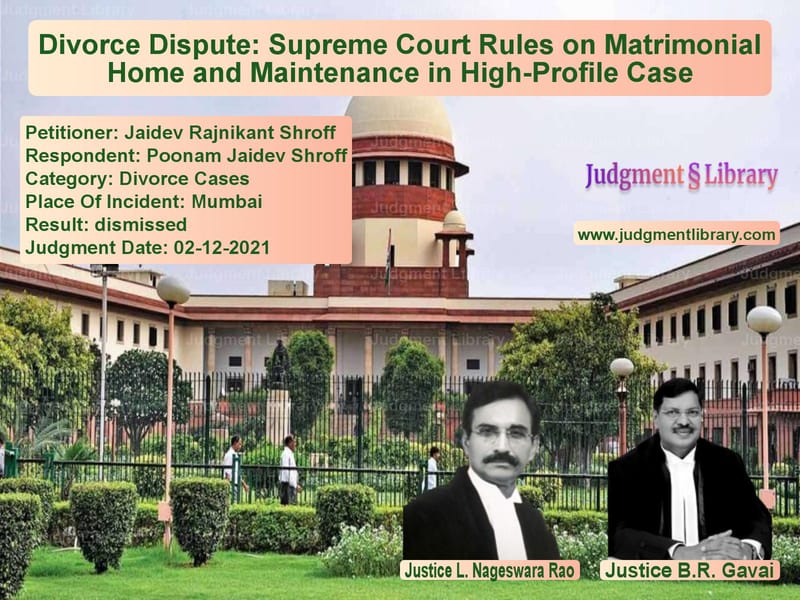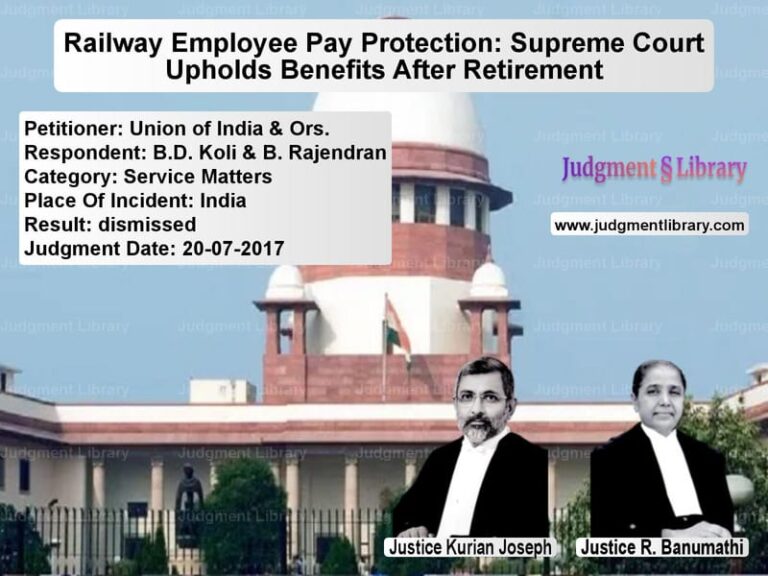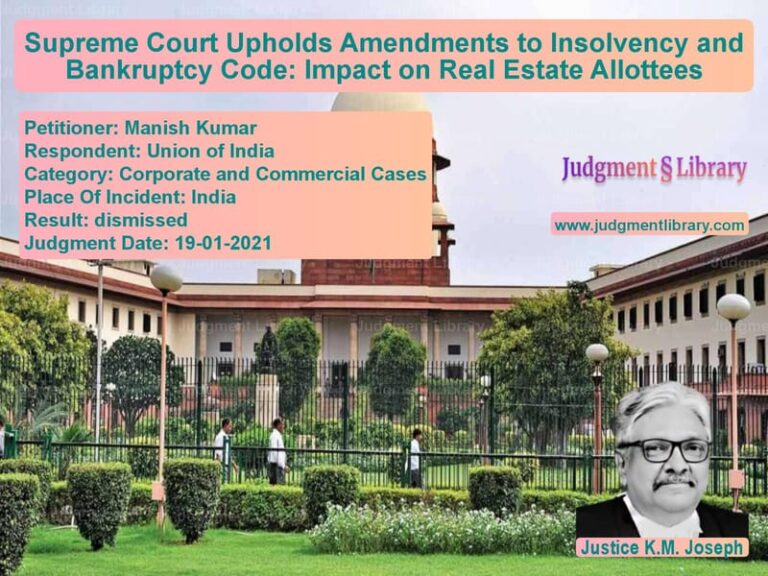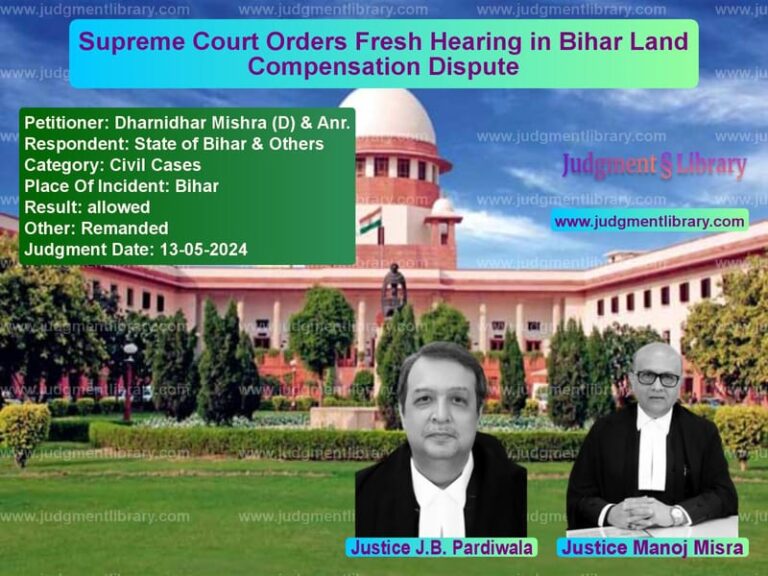Divorce Dispute: Supreme Court Rules on Matrimonial Home and Maintenance in High-Profile Case
The Supreme Court of India recently delivered a significant judgment in Jaidev Rajnikant Shroff vs. Poonam Jaidev Shroff, a long-standing divorce and property dispute involving high-stakes maintenance claims. The case revolved around whether a wife has the right to continue residing in the matrimonial home after separation and the extent of maintenance payable in such situations. The Court upheld the husband’s responsibility to provide a similar standard of accommodation but refused to vacate its previous order granting the wife alternative housing.
Background of the Case
The case involved a bitter legal battle between Jaidev Rajnikant Shroff (husband) and Poonam Jaidev Shroff (wife), who were married on November 27, 2004. Their relationship soured over time, leading to multiple criminal and civil cases between them. The husband filed a divorce petition in October 2015 on the grounds of cruelty. Meanwhile, criminal proceedings were also initiated by both parties against each other.
Read also: https://judgmentlibrary.com/supreme-court-transfers-divorce-case-from-rajasthan-to-gujarat/
One of the core disputes in the case was over a luxury house located at 82, Pali Hill, Bandra (West), Mumbai, where the couple resided before their separation. The husband sought an injunction restraining the wife from entering the matrimonial home, arguing that she had voluntarily moved out. The Family Court granted the injunction, but the Bombay High Court reversed it, ruling in favor of the wife. The husband challenged this decision in the Supreme Court.
Key Legal Issues
- Whether the wife had a right to reside in the matrimonial home under the Protection of Women from Domestic Violence Act, 2005 (DV Act).
- Whether the husband’s offer to provide alternative accommodation satisfied legal requirements.
- The extent of financial maintenance the wife was entitled to receive.
- Whether the husband’s conduct, including alleged adultery, impacted the decision.
Petitioner’s Arguments (Husband)
- The husband contended that the wife had voluntarily left the matrimonial home and was residing at her mother’s house.
- He argued that he had already provided for alternative accommodation and was willing to pay rent for a similar standard of residence.
- He submitted that the wife was demanding excessive maintenance, far beyond what was reasonable.
- He further alleged that the wife’s demand to move back into the matrimonial home was motivated by an attempt to disrupt his life, particularly since he had entered into another relationship.
Respondent’s Arguments (Wife)
- The wife argued that the Pali Hill residence was the matrimonial home where she had every legal right to reside.
- She contended that she was being forcibly kept out due to the husband’s legal maneuvering.
- She claimed that the husband was attempting to evict her in order to live there with another woman.
- The wife further demanded financial support of Rs. 75.26 lakhs per annum for household staff and additional maintenance expenses.
Supreme Court’s Verdict
The Supreme Court, in a bench comprising Justices L. Nageswara Rao and B.R. Gavai, ruled that the wife was entitled to alternative accommodation but could not insist on moving back into the Pali Hill house.
Read also: https://judgmentlibrary.com/divorce-case-transfer-supreme-court-allows-wifes-plea-for-convenience-2/
The Court observed:
“To compel the parties to live together in one house would not be in their best interests. Given the history of acrimonious litigation and multiple criminal cases, such an order would lead to further legal complications.”
The Court noted that the husband had already identified several suitable alternative residences and agreed to bear the rental costs, thereby fulfilling his obligations.
Key Observations by the Supreme Court
- The Court acknowledged that Section 2(s) of the DV Act grants the wife a right to residence in the shared household but clarified that this does not mean she must be given the exact same house.
- The Court held that a similar standard of accommodation in an upscale neighborhood would satisfy legal requirements.
- The Court dismissed the wife’s claims that none of the 17 shortlisted alternative properties were suitable, noting that some of the properties were as large as 12,000 sq. ft. and had similar luxury amenities.
- The Court also dismissed the wife’s demand for Rs. 35.37 lakhs per month as maintenance, stating that her existing maintenance of Rs. 12 lakhs per month was sufficient.
Final Order
- The Supreme Court dismissed the wife’s plea to move back into the Pali Hill house.
- The husband was directed to pay the rent for any property chosen by the wife from the list provided.
- The maximum rent payable was capped at Rs. 30 lakhs per month.
- The Family Court was directed to expedite the pending divorce petition and resolve the matter at the earliest.
Key Takeaways
- Matrimonial home rights are subject to reasonability: The Supreme Court clarified that the right to reside does not mean an absolute right to a specific property.
- Alternative accommodation fulfills legal requirements: A husband offering a similar standard of housing satisfies the obligation under the law.
- Financial maintenance must be reasonable: The wife’s claim for excessive maintenance was rejected in favor of a practical and fair approach.
- Legal clarity on domestic disputes: The ruling serves as a precedent for cases involving high-value matrimonial disputes.
This decision reaffirms that while financial stability and suitable housing must be provided to a separated spouse, unreasonable demands for specific properties or excessive maintenance cannot be sustained in law.
Petitioner Name: Jaidev Rajnikant Shroff.Respondent Name: Poonam Jaidev Shroff.Judgment By: Justice L. Nageswara Rao, Justice B.R. Gavai.Place Of Incident: Mumbai.Judgment Date: 02-12-2021.
Don’t miss out on the full details! Download the complete judgment in PDF format below and gain valuable insights instantly!
Download Judgment: jaidev-rajnikant-shr-vs-poonam-jaidev-shroff-supreme-court-of-india-judgment-dated-02-12-2021.pdf
Directly Download Judgment: Directly download this Judgment
See all petitions in Property Division in Divorce Cases
See all petitions in Alimony and Maintenance
See all petitions in Child Custody
See all petitions in Domestic Violence
See all petitions in Judgment by L. Nageswara Rao
See all petitions in Judgment by B R Gavai
See all petitions in dismissed
See all petitions in supreme court of India judgments December 2021
See all petitions in 2021 judgments
See all posts in Divorce Cases Category
See all allowed petitions in Divorce Cases Category
See all Dismissed petitions in Divorce Cases Category
See all partially allowed petitions in Divorce Cases Category







